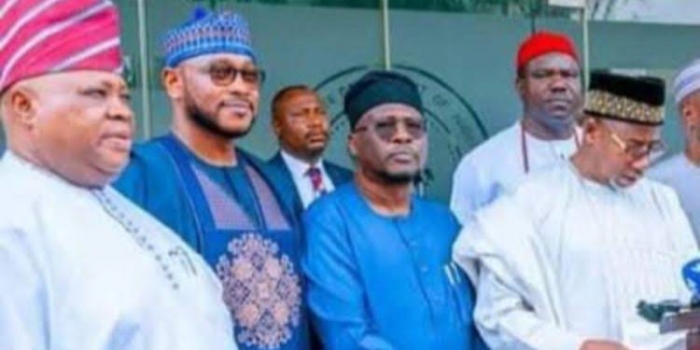Eleven Peoples Democratic Party (PDP) governors have filed a lawsuit at the Supreme Court challenging President Bola Tinubu's declaration of a state of emergency in Rivers State and the suspension of Governor Siminalayi Fubara's administration.
The suit, marked SC/CV/329/2025 and filed on Tuesday, questions the constitutional validity of Tinubu's March 18 executive action, which removed Fubara, Deputy Governor Ngozi Odu, and the Rivers State House of Assembly, replacing them with retired Vice Admiral Ibok Ete Ibas as sole administrator for six months.
The governors—from Adamawa, Enugu, Osun, Oyo, Bauchi, Akwa Ibom, Plateau, Delta, Taraba, Zamfara, and Bayelsa states—are contesting whether the president has the power to dissolve a democratically elected state government under emergency provisions.
Constitutional Questions Raised
The plaintiffs, represented by their state attorneys general, posed three key questions for the Supreme Court's determination:
1. Whether the president can lawfully suspend a governor and deputy governor and replace them with an unelected administrator under emergency powers.
2. Whether the president can suspend a state House of Assembly under emergency rule.
3. Whether such actions violate constitutional federalism and the 1999 Constitution's separation of powers.
The governors argue that Tinubu's move sets a dangerous precedent that could threaten Nigeria's democratic structure, particularly given the National Assembly's endorsement of the suspension.
Legal and Political Implications
The case has significant ramifications for Nigeria's federal system, testing the limits of presidential emergency powers under Section 305 of the constitution. The PDP governors' challenge also reflects deepening political tensions, as Rivers State remains a flashpoint between the ruling All Progressives Congress (APC) and the opposition PDP.
The respondents—expected to include the Attorney General of the Federation and the federal government—have 14 days to respond to the summons.
This legal battle unfolds amid Nigeria's broader security crises, including insurgency in the Northeast and rampant banditry in the Northwest, raising concerns about executive overreach in governance and emergency measures.
Next Steps:
The Supreme Court's ruling could redefine the balance of power between federal and state governments, setting a critical precedent for Nigeria's democracy.
